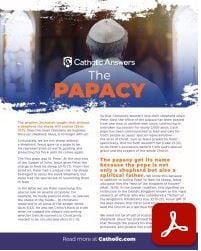
Meaning of Pope
The word pope comes from the Latin papa, meaning father. In the Catholic Church, the pope serves as the spiritual father and servant leader of the universal Church (Matt. 23:11). As the Bishop of Rome, he holds the highest teaching authority, safeguarding Catholics in faith and morals under the guidance of the Holy Spirit, i.e., when teaching in a definitive manner.
The Pope’s Role in the Church
Catholics believe the pope continues the mission of Saint Peter, whom Jesus Christ made the foundation of his Church. As Jesus declares in Matthew 16:18, “And I tell you, you are Peter, and on this rock I will build my church, and the powers of death shall not prevail against it.” In saying these words, Jesus establishes Peter’s unique role among the apostles, and he also guarantees the Church will endure until his Second Coming. To accomplish this mission, Jesus institutes a visible leadership structure founded on Peter and the other apostles (Eph. 2:19-20), one which continues in their apostolic successors (Acts 1:15-26; see Isa. 22:15-25).
The Pope and the Keys of the Kingdom
In Matthew 16:19, Jesus entrusts Peter with the keys of the kingdom of heaven, which symbolize his primacy in governing the Church in Christ’s name. Similarly, Jesus singles out Peter in praying that his faith “may not fail,” so that he can confirm his brethren (Luke 22:31-32). Also, in John 21:15-17, Jesus commands Peter to “feed my sheep,” further affirming his responsibility to lead his fellow Christians faithfully. As the successor of Saint Peter, the pope carries on this apostolic mission, ensuring unity in the Church’s teaching and protecting the Faith from error (see John 14:6; 17:20-23).
Proving the Papacy
Free PDF Download
Papal Infallibility: What It Means
Catholics believe the pope is infallible when he individually defines a doctrine on faith and morals for the entire Church, as well as when he teaches definitively 1) at an ecumenical council with his brother bishops, or 2) does the same in unity with the bishops even though they are dispersed throughout the world. The charism of infallibility does not mean the pope is sinless or otherwise perfect, but rather that, through the guidance of the Holy Spirit, he and his brother bishops will be protected from error when teaching definitively on a particular doctrinal matter—thereby ensuring that the Church remains faithful to Christ’s truth (see CCC 889-891).
How Is a Pope Elected?
When a pope dies or resigns, the Church follows a process established over centuries to elect his successor. The College of Cardinals, composed of Catholic bishops from around the world, gathers in the Sistine Chapel for a secret election known as a conclave. The cardinals pray for the Holy Spirit’s guidance before casting their votes. To be elected, a candidate must receive a two-thirds majority. Once chosen, and provided he accepts his election, white smoke rises from the Sistine Chapel. In the meantime, the new Roman pontiff selects a papal name, and subsequently he is announced to the world with the words, “Habemus papam!” (We have a pope!)
What Happens When a Pope Dies?
When a pope dies, the Cardinal Camerlengo verifies his death and organizes the funeral and burial rites. The Church enters a period of mourning, during which no major decisions are made until a new pope is elected. The deceased pope is traditionally buried in St. Peter’s Basilica, where the mortal remains of many of his predecessors rest.
What About Bad Popes?
What if Pope Francis is a bad Pope? Is Pope Francis a bad pope? Many Catholics worry he might be. We asked Joe Heschmeyer, author of Pope Peter, to examine the concerns and what they mean for our faith.
The Pope’s Authority in the Church
As the successor of Saint Peter, the pope has supreme authority over the Church, a role elaborated on in Lumen Gentium, a document of the Second Vatican Council. Indeed, the early Church believed in the authority of the pope, illustrating that this doctrine goes back to Jesus himself and is thus based on an authentic interpretation of Scripture. Consequently, by God’s provision, the pope ensures faithful continuity in Church teaching, the unity of Catholics worldwide, and, in speaking out definitively on matters of faith and morals, can serve as the world’s conscience. Recent popes, including Pope Francis, have emphasized the Church’s mission of mercy, justice, and evangelization.
Is the Papacy Trustworthy?
Jimmy Akin tackles this common objection, exploring its history and the Holy Spirit’s role in guiding the Church. For more on Church authority, check out Jimmy’s book Teaching with Authority.
The Pope as the Visible Head of Christ’s Church
Because he is rooted in the Lord Jesus Christ, the pope represents and maintains the unity of more than a billion Catholics worldwide. Furthermore, because of the divinely founded and sustained nature of his office, the pope ensures that, despite cultural and historical challenges and his own imperfections, the Church will remain faithful to Jesus and his teachings (John 8:31-32). In his ministry as the vicar of Christ, the pope is also called to engage with global leaders, foster dialogue with Christians not in full communion with the Church, and provide guidance on issues such as human dignity, religious freedom, and social justice.
Why the Pope Matters Today
In a world filled with uncertainty, the pope serves as a moral and spiritual guide. By advancing the Church’s Great Commission (Matt. 28:18-20), he reminds all people of the ultimate end to which God calls them (1 Tim. 2:4; 2 Pet. 3:9). In particular, the pope reminds Catholics of their mission to follow Jesus Christ, uphold the dignity of every human life, and remain steadfast in their faith. As the Church’s chief teacher and shepherd, he preserves the Faith entrusted to the apostles and ensures that Christ’s saving message continues to be proclaimed to all nations.
Additional Resources
From the Shop
Pope Peter: Defending the Church’s Most Distinctive Doctrine in a Time of Crisis
Pope Peter excerpt: The Pope Francis Problem
Pope Peter excerpt: The Fisher Pope
Online Courses
Biblical Images of Peter – Biblical Images of Peter contains 22 short, easy-to-watch videos so you can study at your own pace.
Articles
Where does the Bible say anything about the papacy?
The Papacy in Scripture, No Rocks Required



